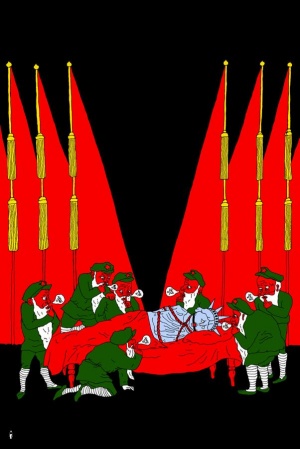“Seven don't mentions”的版本间的差异
来自China Digital Space
| 第5行: | 第5行: | ||
The phrase “seven don't mentions” originated in a [https://chinadigitaltimes.net/2013/05/press-freedom-other-topics-off-limits-for-academics/ directive] allegedly issued by the General Office of the Party's Central Committee to institutes of higher education. The directive, which was leaked on Weibo and [http://chinadigitaltimes.net/2013/05/sensitive-words-seven-say-nots-and-more/ subsequently censored], outlined seven topics that professors and lecturers were forbidden to raise with students: universal values, press freedom, civil society, civic rights, historical mistakes by the Communist Party, elite cronyism, and an independent judiciary (普世价值、新闻自由、公民社会、公民权利、党的历史错误、权贵资产阶级、司法独立). | The phrase “seven don't mentions” originated in a [https://chinadigitaltimes.net/2013/05/press-freedom-other-topics-off-limits-for-academics/ directive] allegedly issued by the General Office of the Party's Central Committee to institutes of higher education. The directive, which was leaked on Weibo and [http://chinadigitaltimes.net/2013/05/sensitive-words-seven-say-nots-and-more/ subsequently censored], outlined seven topics that professors and lecturers were forbidden to raise with students: universal values, press freedom, civil society, civic rights, historical mistakes by the Communist Party, elite cronyism, and an independent judiciary (普世价值、新闻自由、公民社会、公民权利、党的历史错误、权贵资产阶级、司法独立). | ||
| − | Journalist Gao Yu also [http://www.rfa.org/cantonese/features/hottopic/feature-university-05202013100353.html stated] that the seven don't mentions were distilled from a longer official document that also called for promotion of Xi Jinping's [http://chinadigitaltimes.net/china/chinese-dream/ Chinese Dream] concept and the spirit of the [http://chinadigitaltimes.net/china/national-peoples-congress/ National People's Congress]. | + | Journalist Gao Yu also [http://www.rfa.org/cantonese/features/hottopic/feature-university-05202013100353.html stated] that the seven don't mentions were distilled from a longer official document that also called for the promotion of Xi Jinping's [http://chinadigitaltimes.net/china/chinese-dream/ Chinese Dream] concept and the spirit of the [http://chinadigitaltimes.net/china/national-peoples-congress/ National People's Congress]. |
| − | The government has historically sought to contain dissent in institutes of higher education, as student movements such as the [http://chinadigitaltimes.net/china-news/main/1989/ Tiananmen Square Protests] | + | The government has historically sought to contain dissent in institutes of higher education, as student movements such as the [http://chinadigitaltimes.net/china-news/main/1989/ Tiananmen Square Protests] have been sources of major unrest. |
2013年6月7日 (五) 19:47的版本
七不讲 (qī bù jiǎng): seven don't mentions
The phrase “seven don't mentions” originated in a directive allegedly issued by the General Office of the Party's Central Committee to institutes of higher education. The directive, which was leaked on Weibo and subsequently censored, outlined seven topics that professors and lecturers were forbidden to raise with students: universal values, press freedom, civil society, civic rights, historical mistakes by the Communist Party, elite cronyism, and an independent judiciary (普世价值、新闻自由、公民社会、公民权利、党的历史错误、权贵资产阶级、司法独立).
Journalist Gao Yu also stated that the seven don't mentions were distilled from a longer official document that also called for the promotion of Xi Jinping's Chinese Dream concept and the spirit of the National People's Congress.
The government has historically sought to contain dissent in institutes of higher education, as student movements such as the Tiananmen Square Protests have been sources of major unrest.





